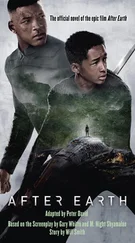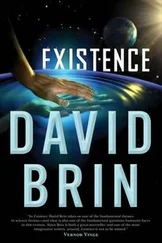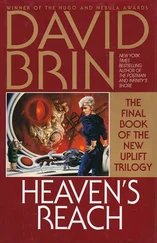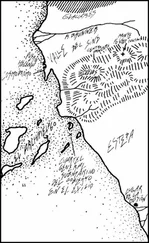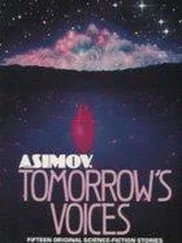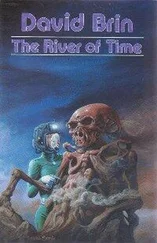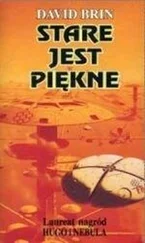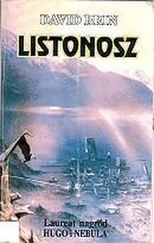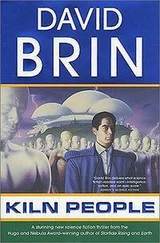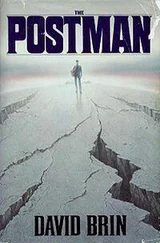Interestingly, though, after finishing Earth I learned that two astronomers at the University of Cambridge, Ian Redmount and Martin Rees, now predict beamlike gravitational radiation might be emitted from certain superheavy objects out there. So who knows? In any event, although I have my union card as a physicist, I don’t claim to be qualified in the specialized area of general relativity. The science of “cavitronics” can safely be dismissed as bona fide arm waving.
Of course, Beta served a higher function in the book than perpetrating wild-eyed conjectures on physics. The taniwha let me include the very guts of the planet — its complex mantle and layered core — as central concerns of my characters. (What book could claim to be about the entire Earth if it left out over ninety-nine percent of the planet’s volume and mass?) Anyway, nothing spices up a novel like a monster threatening to gobble up the world.
Sociological trends are even more problematical than tomorrow’s physics. While this book was in the works, changes in the real world seemed ever about to overtake my wildest speculations. One result — readers of early drafts suggested I was being much too optimistic in predicting an end to cold war tensions. But by the final draft some were turning around and complaining that I was shortsighted, because security alliances like NATO couldn’t possibly still exist in fifty years’ time! There wasn’t that much difference between drafts. It was the world that went into fast-forward rewrite mode.
(Not that I’m convinced we’re in for relaxing times just because a few walls have come down. It might be argued that the cold war is ebbing in large part because neither side can afford it anymore. Other serious threats loom to take its place. And nations will probably still make and break alliances as they wrestle over dwindling resources.)
Likewise, I find myself bored with the current fashion of depicting a tomorrow dominated by Japanese economic imperialism. Doesn’t anyone remember when it seemed that the Arabs were bound to own everything? Before that, Europeans expressed dismay at American industrial dynamism. Beware of assumptions that seem “obvious” in one decade. They may become quaint in the next.
Daily life may be even harder to predict than global politics. One crisis I see looming involves the plight of women, which seems bound to go far beyond matters typically addressed today by feminists. Equality under law and in the workplace must be achieved, of course. (And in many parts of the world that battle has barely begun.) But of growing concern to women in the West is a problem I hardly ever hear spoken of by all those learned theoreticians in ivy halls. That problem is the decay of marriage and family as a dependable way of life. This is a subject so difficult — and so dangerous for a male author to deal with — that I’m afraid it got short shrift in this novel, despite my belief that it will reach a dire climax during the decades ahead.
Perhaps I did a little better with the generation gap. Unlike authors of so-called “cyber-punk” stories, I just don’t find it plausible that undisciplined, hormone-drenched, antisocial young males will forsake thousands of years of fixation on muscular bluster and come instead to dominate high tech during the next century. Putting aside that unlikely cliche, I had some fun suggesting instead that the descendants of portable video cameras might be used as weapons by elderly committees of vigilance. The demographics in countries like the United States, Japan, and China do seem to point to a period some are already calling the “empire of the old.”
Meanwhile, in Kenya, the average age at present is just fifteen, and the birth rate skyrockets.
For some notions I owe a debt to other authors. I’ve already referred to John Brunner, whose award-winning novel Stand on Zanzibar was among the very best fifty-year projection novels of an earlier day. Likewise, Aldous Huxley’s work was inspirational.
The idea of a human “cultural singularity” — in which our power and knowledge might accelerate so quickly that the pace grows exponentially in months, weeks, days — making all current problems academic in a flash — is one that’s been brewing for a while, but was depicted especially well in Vernor Vinge’s Marooned in Real Time . The notion of capital punishment by “disassembly” came from the novels of Larry Niven.
Many authors since de Chardin have written about the creation of some sort of “overmind,” into which human consciousness might someday either evolve or subsume. Traditionally this is presented as a simple choice between obstinate individualism on the one hand, or being homogenized and absorbed on the other. I have always found this either-or dichotomy simplistic and tried to present a different point of view here. Still, the basic concept goes back a long way.
The idea for depicting a space shuttle, crash-landed on Easter Island, was provoked by a Lee Correy science fiction story, “Shuttle Down,” which appeared in Analog Magazine a decade ago.
Likewise, much of the discussion of human consciousness was inspired by articles in respectable neuroscience journals, or cribbed from innovative thinkers like Marvin Minsky, Stanley Ornstein, and even Julian Jaynes, whose famous book on the origin of consciousness might well have made a splendid science fiction novel.
The Helvetian War, on the other hand, I can blame on no one but myself. (I expect it will probably cause me no little grief.) Nevertheless, for this book I needed some dark, traumatic conflict to reverberate in my characters’ past — as Vietnam, World War II, and the Holocaust still make contemporary folk twitch in recollection. It had to be something at once both chilling and surprising, as so many events over the last fifty years have been. (And frankly, I’ve had it with stereotyped superpower schemes, accidental missile launches, any other cliches.) So I tried to come up with a scenario that — if not very likely — was at least plausible in its own context. Then I chose to center it around a nation that’s presently among the very last anyone would think of as a serious threat to peace. I don’t know if it works, but so far it has rocked a few people back and made them say, “Huh!” That’s good enough for me.
Speaking of war — one reader asked why I barely refer to one of today’s principle concerns… the Great Big War On Drugs. Will it have been solved by the year 2038?
Well, not by any program or approach now being tried, that’s for sure. I’m not fatalistic. It makes some sense to regulate when and how self-destructive citizens can stupefy themselves, especially in public. Social sanctions have already proven more effective than laws at driving down liquor and tobacco consumption in North America. So much that distillers and cigarette makers are in a state of demographic panic.
But as for trying to eradicate drugs, right now we just seem to be driving up the price. Addicts commit crimes to finance their habits, and convey billions of dollars to pushers who are, inarguably, among the worst human beings alive. Anyway, it’s been shown that some individuals can secrete endorphins and other hormones at will, using meditation or self hypnosis or biofeedback. If such techniques become commonplace (as no doubt they will… everything does), shall we then outlaw meditation? Should the police test anyone caught dozing in the park, to make sure he isn’t drugging himself with his own self-made enkephalins?
Reductio ad absurdum. Or as Dirty Harry once said, we’ve got to learn our limitations.
Which only leads to a much deeper problem that has plagued society ever since before Darwin. That problem is moral ambiguity .
Читать дальше

